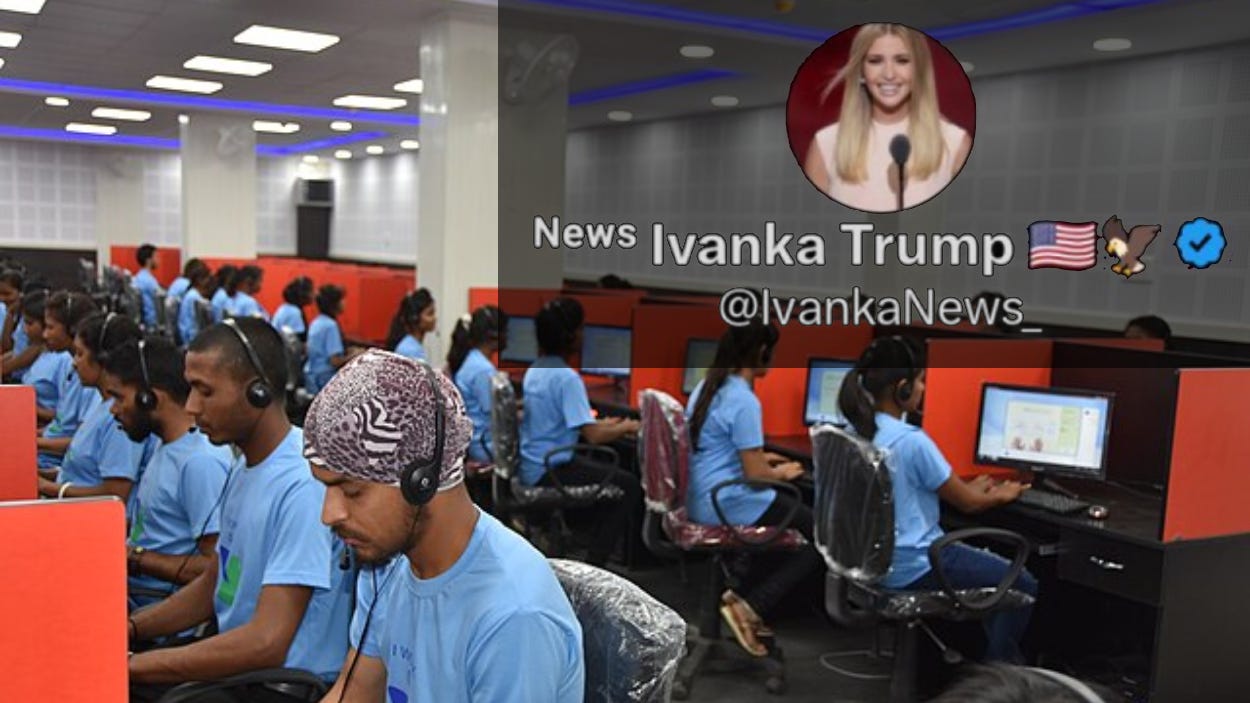Blowback and the international troll industry
Why are so many Twitter reactionaries from outside of the United States?
For a few hours yesterday Twitter users got a brief glimpse into the secretive world of anonymous online reactionaries — and as it turns out, a lot of them aren’t from the United States.
A new feature that Twitter rolled out and quickly rolled back revealed the country of origin of every account on the site and indicated whether they were using a VPN. And though the rollback has prevented any kind of rigorous quantitative analysis, one takeaway was impossible to miss: a wildly disproportionate number of hard right accounts on the site were registered outside of the United States.
This is something that folks who watch the online right have suspected for quite some time, but typically one can only find indirect evidence for it; one common giveaway, for example, is when ostensibly American accounts rely on spellings that one only ever encounters in British English. In other cases, the account simply revealed where he was from in the past before changing his story and pretending to be a US resident. But most of the time, Twitter left no way for users to tell whether the reactionaries flooding the site represented a grassroots movement of Americans or something else entirely.
Predictably, liberal critics have seized on the revelation to attribute the accounts to influence operations by the Russian government. “You just got a peak behind the curtain at just how much of the MAGA hatred is just Russian propaganda,” academic Adam Cochran posted.
But evidence that an account originated in Russia — or more often, Eastern Europe, as in the case of influencers like MAGANationX — does not actually demonstrated that it is part of a coordinated propaganda campaign directed by the Russian government. And more to the point, an overwhelming number of these accounts come from countries other than Russia like Mexico, India, and Nigeria.
What do all of these countries have in common? Certainly not their diplomatic relationship with the United States, which ranges from hostile to ambivalent to cooperative. It seems odd to suppose that Mexico’s Claudia Sheinbaum, for example, is running a covert influence operation to gin up support for a Trump administration that routinely sabre rattles against her country.
The obvious answer to that question: all of these countries are longstanding sources of cheap labor. And that brings us to a much simpler explanation. Twitter is overrun with Republican trolls from cheap labor markets because Republican operatives are paying them to promote the GOP.
The emergence of an international labor market for social media based domestic influence operations should not come as a surprise to anyone who has been paying attention to the evolution of political marketing over the last decade. It has been nearly ten years, for example, since we learned that David Brock’s “Correct the Record” PAC had poured more than a million dollars into unnamed rapid-responders operating on multiple social media platforms. And we know that groups like the secretive Rockridge Network have invested millions into “influencer programs” in an effort to build a “new conservative ecosystem”.
Media coverage of these dark money campaigns has been sparse, and most of it has focused on their connection to US-based microcelebrities like Curtis Yarvin. But these projects have a limited role in the political information space, primarily existing to signal boost other actors from whom they can maintain plausible distance. Program hosts like Anna Khachiyan and Tucker Carlson, for example, now mostly function to mainstream more controversial figures like Nick Fuentes.
An even more relevant example of this would be the role Carlson played in promoting LibsofTikTok. During its rise to prominence, LibsofTikTok operated exactly like many of these international influencers did: as an anonymous and depersonalized font of outrage and manipulative misinformation. But it took known media figures like Carlson and Glenn Greenwald to promote LibsofTikTok to prominence.
The simplest explanation for the proliferation of international MAGA trolls is that the usual cohort of social media obsessed Republican oligarchs are doing what we already know that they are doing — paying online influencers — and have simply outsourced their efforts. By setting up troll farms in India and Nigeria, they can pay foreign workers a pittance to disseminate key talking points and cross-promote key influencers.
In other words, the international origin of so many MAGA influencers probably isn’t evidence of some massive intergovernmental conspiracy to promote Donald Trump; it’s just evidence of capitalism at work. The wealthy ruling class of the United States is doing what it always does — cutting labor costs — to extend its influence over a domestic audience.
The grim irony here is that the cheap deregulated labor markets that American oligarchs are exploiting to run domestic influence operations are a direct result of our imperialism abroad. In Mexico, for example, an economy long crippled by NAFTA, America’s drug war, and extortionary debt repayments has left the country with a minimum wage that is still less than two dollars an hour in some region. Moreover, the cost of living remains so low there that even some hard-right pundits from the US have expatriated to cities like Guadalajara to continue their media work.
The labor markets that imperialism has created abroad can facilitate online influence operations at a much greater scale, and shroud them in much greater secrecy, than campaigns based in the US. In that sense, these international troll farms can be understood as a distinctively modern form of ideological blowback. Capital, in its efforts to exploit the economic periphery, has created conditions that now facilitate its efforts to advance an agenda of neoliberal austerity and tax-cuts in the United States.
UPDATE: Twitter’s location feature has been enabled once again, apparently permanently!



